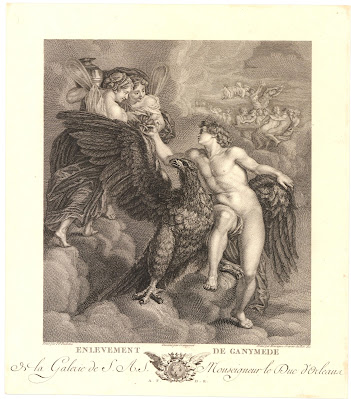In England, and wherever people speak that same language, the myth about Ganymede tends to be glossed over ... he is abducted by Jove in the form of an Eagle to live amongst the immortals as Jove's cup-bearer ... the bit that gets left out is the messy bit about forced sex between a male adult and a male child, or youth. This kind of sex was acceptable to the Greeks in ancient times, and remains a "fact of life" universally, although it is quite properly unacceptable to most people.
The THEOI website states ...
"GANYMEDES (Ganymede) was a handsome Trojan prince who was carried off to heaven by Zeus in the shape of an eagle where he was appointed as cup-bearer of the gods. Ganymedes was also placed amongst the stars as the constellation Aquarius, his ambrosial mixing cup as Crater, and the eagle as Aquila. Ganymedes was often portrayed as the god of homosexual love and as such appears as a playmate of the love-gods Eros (Love) and Hymenaios (Hymenaeus) (Marital Love).
Ganymedes was depicted in Greek vase painting as a handsome youth. In scenes of his abduction he holds a rooster (a lover's gift), hoop (a boy's toy), or lyre. When portrayed as the cup-bearer of the gods he pours nectar from a jug. In sculpture and mosaic art Ganymedes usually appears with shepherd's crock and a Phrygian cap.
The boy's name was derived from the Greek words ganumai "gladdening" and mêdon or medeôn, "prince" or "genitals." The name may have been formed to contain a deliberate double-meaning."
In comparitively recent times the mythical stereotypes have morphed, so that Ganymede is no longer snatched from innocence to debauchery by an Eagle ... in 20th Century Spain, on the roof of several insurance offices, he became a triumphant and heroic figure perched on the shoulder of ... wait for it ... the PHOENIX.
What were the Spaniards thinking ? And should we see it as symptomatic of the decadence of people whose notion of heroism was tainted with Imperialism and with deeply embedded cultural beliefs of racial superiority ? I would guess that the people who commissioned this sculpture lived in hope of the revival of Spain as a global power.
The story of Ganymede was told many times in Ancient literature. Details vary. The classics website THEOI lists and quotes them all ...
https://www.theoi.com/Ouranios/Ganymedes.html


